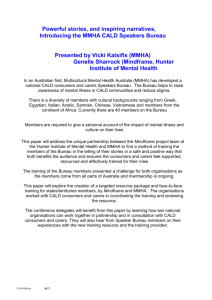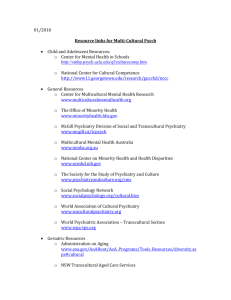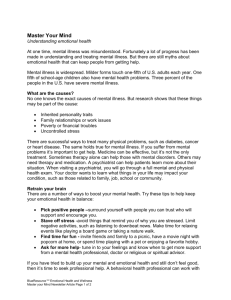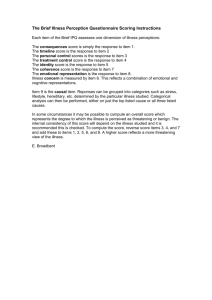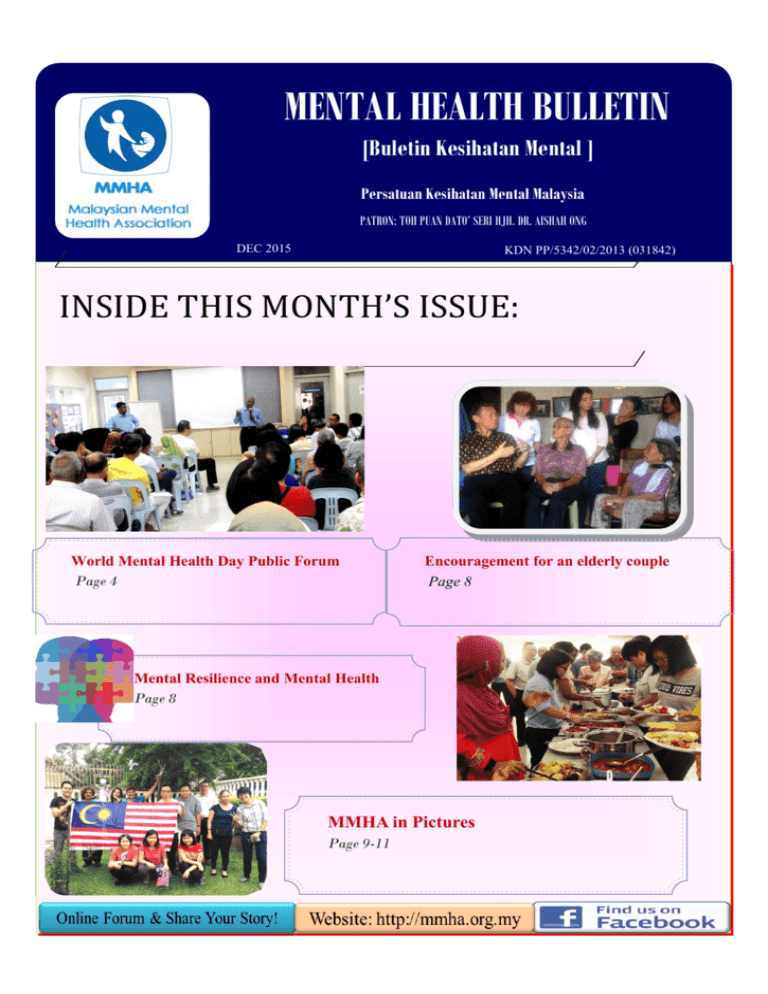
MENTAL HEALTH BULLETIN
[Buletin Kesihatan Mental ]
Persatuan Kesihatan Mental Malaysia
PATRON: TOH PUAN DATO’ SERI HJH. DR. AISHAH ONG
DEC 2015
KDN PP/5342/02/2013 (031842)
INSIDE THIS MONTH’S ISSUE:
World Mental Health Day Public Forum
Page 4
Encouragement for an elderly couple
Page 8
Mental Resilience and Mental Health
Page 8
MMHA in Pictures
Page 9-11
MMHA MENTAL HEALTH BULLETIN Dec. 2015 Issue 3/ 2015
1
CONTENTS:
EDITORIAL
President’s message
Pg. 3-4
World Mental Health Day Forum
Pg. 4
Advisor
Datin Dr. Ang Kim Teng
Editor
1st Prize winner of the World Mental
Health Day Short Essay Competition
Pg. 5-6
Pn. Fazlin Badri
Caregiver Education Programme—Is it
useful?
Pg 7
Assistant Editor
Chin Chi Onn
A trip to meet an elderly couple
Pg. 8
Editorial team
Mental Resilience and Mental Health
Pg. 8
Dr. Eileen Nadarajah
Happenings in MMHA
Pg 9
Lum Khay Xian
MMHA Activities
Pg 10
MMHA Rehabilitation Activities
Pg 11
MMHA Management Committee
Mr. See Cheng Siang - President
Dato’ Dr. Andrew Mohanraj - Deputy President
Madam Poh Kim Pheng - Vice President
Dr. Ng Chong Guan
- Vice President
Mdm. Lee Siew Bee
- Hon. Treasurer
Datin Dr. Ang Kim Teng - Hon. Secretary General
Mr. Mohan Chitran - Asst. Hon Secretary General
Nurhijjah bt. Mat Zin
Santa Kumarie
Committee Members
Dr. Eileen Nadarajah
Dr. Ivan Thomas
Dr. Anne Yee
Mr. Harpajan Singh
Mr. Kamal Abdullah
Mdm. T. Mala Davi
Datin Seri Aleena Abdullah
Publisher:
Malaysian Mental Health Association (MMHA): No. 8 Jalan 4/33, off Jalan Othman, 46050 Petaling Jaya
Telephone: 03 7782 5499; Fax: 03-7783 5432 , Email: admin@mmha.org.my; Website : http://mmha.org.my/
All rights reserved. Requests for bulletin or permission to reproduce or translate MMHA Mental Health bulletin – whether for
sale or for noncommercial distribution – should be addressed to MMHA as above. Views expressed by the individual authors
may not necessarily reflect that of MMHA. MMHA does not warrant that the information contained in this publication is
complete and correct and shall not be liable for any damages incurred as a result of its use.
MMHA MENTAL HEALTH BULLETIN Dec. 2015 Issue 3/ 2015
2
PRESIDENT’S MESSAGE
Mental illness is an illness where the
cause is still not clearly understood.
There is no specific test to diagnose
the illness unlike most other illnesses.
Often, the first symptoms can only be
felt by the affected person and changes in the person may not be obvious
until it has affected the person’s daily
functioning. Even then, it may be perceived as something
temporary which will go away. Early diagnosis and treatment
is important for recovery. This is dependent on awareness of
the illness, and acceptance that mental illness is an illness that
needs to be treated. Awareness and acceptance are not only
for the affected person, but also for close family members
since the affected person may not be in a clear state of mind
when the illness sets in, especially for those with psychotic
conditions like schizophrenia. Stigma and negative perception
of mental illness are barriers to acceptance and early treatment. This has to be addressed through education.
The Malaysian Mental Health Association has in recent years,
been giving emphasis on public education on various mental
disorders through its monthly talks, and also to schools, colleges and corporations. However, this is not sufficient as such
talks can only reach out to a limited number of people. We
are currently in discussion with a company to enhance the use
of social media to reach out to more people in the country.
More people need to know about mental illness. It is common
and it can ruin lives, relationships, families, careers and the
future of young people who have not completed their education. It can even be fatal for example, cases of suicide committed due to depression. I urge everyone to continue to support us in our effort to do more for the afflicted and their families.
Mr. See Cheng Siang,
President,
Malaysian Mental Health Association
近几年来,马来西亚精神健康协会着重于透过每个月一次
会长的讯息
讲座与提供学校、学院及公司提高公众对不同的精神疾病
精神疾病的病因至今还没能完全被了解。与其他疾病不
的认知。然而,这些讲座只能让我们把正确的讯息传达给
同,医生并没有特定的诊断仪器来检验与确认病人是否患 少数人,不足以引起社会关注。因此,我们正与一间公司
上精神疾病。普遍来说,精神疾病患者是最先体会其病状 探讨如何能更好地利用社交媒体来把精神疾病医疗资讯传
的,而精神疾病所带给其患者的变化程度也从一开始的轻 达给群众。
微与不易被察觉逐渐转为严重以致患者的生活作息深受影
响。然而,这些往往会被认为是暂时性的,过一阵子就会
好起来。事实上,提早诊断与治疗对精神病患者的康复极
为重要。这是需要对精神疾病的认知及接受它是需要被医
治的疾病。由于患者在精神病的影响之下神智与意识模
糊,尤其是精神分裂症所导致的思觉失调,患者及他的家
属亲人必须提高对精神疾病的认知与接受它。社会对精神
大众必须更多的了解精神疾病。精神疾病是即普遍,也可
给患者的人生、人际关系、亲情、甚至给还没完成学业的
年轻人的前途带来极其负面的影响。 在某些情况下,它
甚至可以致命;譬如说因忧郁症发作所导致自杀的案例。
我在此恳请大家继续给予我们支持以让我们能持续地向患
者与他们的家人伸出援手。
病的歧视与负面的标签却成为了人们接受精神疾病及及早
接受治疗的障碍。我们希望能借教育来改善人们对精神病 马来西亚精神健康协会
的看法。
施自生先生
Correction
In the last issue on the story MMHA - A glimpse of the past, we had inadvertently stated that Ms. Elsie Lee, a past MMHA
President, was the current President of the Malaysian Medical Social Workers Association. Her actual position is Secretary
General of Malaysian Social Workers Association. We apologise for the error made.
MMHA MENTAL HEALTH BULLETIN Dec. 2015 Issue 3/ 2015
3
PERUTUSAN PRESIDEN
Penyakit mental adalah sejenis penyakit yang puncanya
masih belum difahami sepenuhnya. Tiada ujian khusus untuk
menentukan penyakit ini berbanding penyakit-penyakit lain.
Biasanya simptom permulaan hanya dirasakan oleh mereka
yang mengalaminya dan perubahan yang berlaku adalah tidak
ketara sehinggalah ia menggugat kefungsian harian individu.
Namun, ia mungkin bersifat sementara dan hilang begitu sahaja. Diagnosis dan rawatan awal sangat penting untuk kesan
pemulihan. Keadaan ini bergantung kepada kesedaran penerimaan individu bahawa ia adalah sejenis penyakit yang
perlu dirawati.
Kesedaran dan penerimaan bukan sahaja ke atas mereka yang
mengalami penyakit, bahkan ahli keluarga yang rapat memandangkann pesakit mungkin berada dalam keadaan yang
tidak stabil ketika menghidap penyakit ini, terutamanya
mereka yang mengalami penyakit psikotik seperti skizofrenia. Stigma dan persepsi negatif terhadap penyakit ini merupakan halangan kepada penerimaan dan rawatan segera. Ini
perlu di atasi dengan pendidikan dan pengetahuan.
Persatuan Kesihatan Mental Malaysia (MMHA) beberapa
tahun kebelakangan ini telah memfokuskan pendidikan
awam ke atas pelbagai topik berkaitan kesihatan dan
gangguan mental melalui ceramah bulanannya di MMHA,
serta kepada sekolah-sekolah, kolej dan organisasi. Namun
begitu, ia masih belum cukup kerana ia hanya mencapai
kumpulan kecil dan bilangan yang terhad. Masa kini kami
dalam perbincangan bersama sebuah syarikat untuk
menggunakan kaedah media sosial bagi memperluaskan
publisiti kepada lebih ramai kumpulan sasar.
Lebih ramai individu perlu mengetahui tentang penyakit
mental. Ia adalah perkara lazim yang boleh memusnahkan
kehidupan, perhubungan, keluarga dan masa hadapan golongan muda yang tidak dapat menyempurnakan pengajian
mereka. Ia mungkin lebih teruk apabila usaha membunuh
diri berlaku kesan daripada kes kemurungan. Sokonglah
kami dalam usaha memberikan sokongan kepada
penghidap dan ahli keluarga mereka dalam mengharungi
keadaan ini.
Encik See Cheng Siang,
Presiden,
Persatuan Kesihatan Mental Malaysia
WORLD MENTAL HEALTH DAY PUBLIC FORUM
- Dignity for the Mentally Ill The theme for this year’s World Mental Health Day (2015) is
Dignity for Mental Health. In conjunction with WMHD celebration, MMHA held a public forum entitled “Dignity for the
Mentally Ill” on 10th October to highlight the need to treat
those with mental illness with dignity. The session was
graced by three speakers, namely Prof T. Maniam, Consultant Psychiatrist from Hospital UKM; Miss Elsie Lee, Secretary
General of the Malaysian Association for Social Workers and
Mr. Hasbeemasputra Abu Bakar, a mental health advocate
and social activist. The session was moderated by Dato’ Dr.
Andrew Mohanraj, MMHA Deputy President. It was well
attended with over 80 participants.
tally ill and help them to seek appropriate treatment as even
the most severe mental illness can be treated.
Prof. Maniam, the first speaker, described Dignity as an inherent human right (as opposed to Respect, which must be Ms Elsie Lee, who was a Past President of MMHA (19 ),
earned), that every human is worthy regardless of age, gen- spoke on the role of social workers in meeting the social
der, race, color or socioeconomic status. Often, people with needs of those recovering from mental illness such as jobs,
mental illness are robbed of their dignity as though they and housing among others. She lamented that due to the
have no feelings or self-worth, with humiliation, discrimina- lack of public knowledge about mental illness, many social
tion and degrading remarks. Healthcare for the mentally ill workers experienced difficulties in supporting those with
has since improved with better ward facilities, more privacy mental illness in the community. She also took the opporand personalized care, better trained staff to handle them tunity to inform the audience on the work of social workers
with sensitivity. The public were advised to refrain from who are registered under the Malaysian Council of Social
making jokes about mental illness, report abuse of the men- Work.
MMHA MENTAL HEALTH BULLETIN Dec. 2015 Issue 3/ 2015
4
WINNER OF THE SHORT ESSAY COMPETITION
in conjunction with World Mental Health Day 2015
Back From The Brink - A Love Story
Where do I begin - to tell my story ... ?
E is the eldest of my three offspring - hardworking, intellectual, obedient and responsible. During my two decades of working life, I relied on her to look after two
younger siblings as they stayed with my in-laws on
schooldays. At home, during weekends, she was also my
able assistant housekeeper, helping with household
chores. From primary school right until her early (out-ofstate) university years, E had been a role model tai kah
jie to her sister and brother - with her commendable
grades and exemplary character.
However, things changed catastrophically - when she was
stricken with schizophrenia - within a month of starting
work upon obtaining her diploma. It began with her having sleepless nights, rambling non-stop, re-arranging her
room furniture and rummaging plus packing her belongings to leave. At first, we were ignorant of her actual
state of mind, thinking that she was suffering from stress
at work and, perhaps, rebelling against her disciplined
upbringing. The circumstances worsened with her incoherence including verbal abuse (at me) in response to our
concern and written notes accusing me of all sorts of outrageous behavior while defacing my photos in albums/on
display. Initially, my husband and I tried sending her for a
counselling session during which she was 'normal' but
lashed out at us in the car enroute home. Finally, we had
to trick her into visiting a psychiatrist who - witnessing her
dramatic demeanor - decided that she be warded right
away.
That hospitalisation was the first of many mental ward
admissions that my first-born had to undergo for the next
eight years. In fact, having her hospitalised was our only
resort whenever she had her 'breakdown' as it was impossible for her to take medication not to mention our being
helpless at her manic moods.
Throughout the time, her relationship with our clan members suffered as her juvenile sibs grew estranged while
she was 'alienated' by my simple-minded in-laws (who
believed she was 'possessed') as well as her ever busy/
volatile dad (whose only constructive contribution was
'calmly' chauffeuring us to and fro the hospital). As her
sole caregiver (fortuitously, I was unemployed at the time
having quit the rat-race earlier), I was her only ally despite
being her 'punching bag' whenever she was in her psychotic phase.
Those were years of upheaval, following E's diagnosis,
when I was kept on my toes worrying about her well-
being: distressed over her delusionary days as well as
dreading the drama involved in warding her. And admitting her via emergency entailed the need of ambulance (in her sedated state) as well as police car (twice!)
in addition to our own vehicle (with her 'spewing venom'
along the way). Oftentimes, upon our arrival at the
emergency ward, I was mistaken for the 'patient' (in my
traumatised state) while E was looking cool as cucumber! My only respite came once she was warded as I
could then rest - with her getting professional care and
looked forward to visiting our (post-medicated/pleasant)
daughter.
{Ironically and remarkably, through all these, our girl
showed her fortitude in holding (albeit briefly) a number
of jobs which she applied for - practically each time - upon discharge from hospital. So strong was her determination to improve her academic qualification, she even
quit working to pursue her degree course, graduating
belatedly against all odds, the oldest one in her batch.}
Thankfully, I learnt to manage E's many mental meltdowns which invariably ended with (week-long) hospital
stays - except for her last case, circa 2011/2012. That
particular episode - which spanned nine harrowing
months - was the most devastating for both caregiver
and patient as well as our kinfolk. It happened during a
period of significant events: her graduation ceremony;
her three family outings (our rare holiday together as
adults) and passing of her paternal grandparents within
six months of one another. The situation deteriorated
when she was simultaneously scammed of her (hardearned) savings via an online acquaintance. Possibly, the
potent combination of stresses: both positive
(excitement over her long-awaited university convocation and overdue family gatherings) and negative (grief
over the loss of her beloved grandparents as well as
guilt/shock upon realising too late that her newfound
Cont ….pg 6
5
MMHA MENTAL HEALTH BULLETIN Dec. 2015 Issue 3/ 2015
Cont…. from pg. 5 (Back from the Brink - A love story)
friend turned out to be a conman) took a heavy toll on
her increasingly fragile mind. However, it was mainly
omission to take her medication through either willful
neglect or forgetfulness that led to her monumental meltdown.
This time, she had the tables turned on us - frazzled with
(two) funerals - by initiating her ward admission through
lodging a police report! Then, while hospitalised, our former 'model' inmate who used to actively participate in
therapy sessions at the ward somehow turned 'rogue'
constantly upsetting the nurses and even doctors (whom
she used to respect). Eventually, after months of discharges/re-admissions during which she created havoc at
home (on the eve of Chinese New Year), we were forced
to institutionalise her.
Despite my (and her vehement) initial misgivings, having
her stay at the nursing home heralded the turning point in
E's long drawn-out battle with her angst-ridden ailment. After three months of living with fellow internees;
following a daily routine of medication, counselling and
social activities, she acquitted herself admirably - totally
transformed. In fact, she was considered the most outstanding inmate to 'graduate' before the normal rehabilitation duration of four to six months.
It has been almost three years since E's return to normalcy and working for nearly two years now. Her problematic past seems to be forgotten as she strives to make up
for lost love/time in adopting a cheerful, laid-back disposition and healthy (daily) schedule. Meanwhile, the rest of
our family have slowly but surely accepted her back to the
fold including my two other grown-up children who are
leading their own lives now.
As for me, my perseverance has paid off as I - in the
midst of empty nest syndrome - am rewarded with a
'born-again' daughter as well as close confidante cum
travel companion.
The trials and tribulations of living with a mentallyafflicted loved one was actually a blessing in disguise for
me. Firstly, I have become more health-conscious and
follow an exercise routine, a no-no during my younger
days. Secondly, I have become more open-minded, patient and positive through countless crisis management. Thirdly, those ward visits during which I met psychiatric patients (from teenagers to elderly folks) plus
reading up on the illness gave me an insight on the fragility and reality of mental health in our society.
Furthermore, I am consoled by the fact that schizophrenia - the most severe mental disorder - can be controlled by proper lifestyle, regular treatment and right
attitude (E is living proof of this). Naturally, love and
moral support play a vital role.
Sadly, the social stigma attached to the illness is still
strong - especially in the corporate world of employment and insurance. Our society's discrimination towards recovering mental patients (on medication) is
quite unfounded as most of them are able to lead normal lives. Ironically, the real danger is those undiagnosed cases which manifest themselves in violence such
as road rages and even murder.
I am optimistic that with more awareness and education, this much-maligned malady can be regarded like
other chronic conditions while its sufferers face no prejudice in rebuilding their lives.
By: CSK
Cont … from pg. 4 (WMHDay Public Forum)
Mr Hasbee shared his experience with undignified treatment a person living with mental disorder received where
the dignity of an ill person is at the mercy of the environment and the community he is in. He noted that most people with mental illness are not given adequate opportunities to express themselves and fight for their needs. Stigma
has undoubtedly created a barrier for people with mental
illness to reach out for help and this in turn affected their
quality of life.
The forum highlighted the need for MMHA to play a bigger
role in advocating for the mentally ill, speaking out for them
and their needs, and influencing public opinion and government policies for the benefit of the mentally ill and
their care-givers. The meeting ended with a Question and
Answer session moderated by the Chairman.
By Mr. Chin Chi Onn,
Mental Health Rehab Officer, MMHA
MMHA MENTAL HEALTH BULLETIN Dec. 2015 Issue 3/ 2015
6
Caregiver Education Programme (CEP) – Is it useful ?
Caregivers are important pillars of support for people who are
recovering from mental illness. Families generally have very
little prior knowledge about mental illness. Many who cared
for their loved ones with mental illness tend to neglect their
own health where they focus exclusively on the ones whom
they support. In regards to this, MMHA has been conducting
the Caregiver Education Programme since 2005, where it was
earlier called the Family Link Programme. Both programmes
originated from the US, and have been adapted by various
countries like Hong Kong and Singapore in Asia.
The Family Link Programme (FLP) was revamped in 2015 by
MMHA upon the completion of Training of Trainers Course
conducted by Caregiver Alliance Ltd of Singapore, an NGO
dedicated to caregiver support. In order to enable a more productive understanding of the course, it was extended from a 2day 8-module programme to a 3 ½ days 12 module programme which is usually held over 4 week-ends.
The aim of the programme is to provide caregivers the necessary knowledge to empower them to be more effective caregivers to their loved ones. This is because in caring for their
loved ones, most caregivers will experience multiple stages of
caregiving where it would require them to manage their stress,
flourish new skills while sustaining the level of flexibility to
adapt to the changes in the needs of their loved ones. In fact,
many caregivers are usually left alone to take care of their
loved ones and are usually deprived of emotional support. In
accordance to this, the programme also provides them an opportunity to meet and share their emotional burdens, learn
from each other and to move forward with more confidence
knowing that they are not alone.
from 67% to 90% and averaging 75% (Fig. 1). The response
rate was 62%. The response to the mandarin programme was
even better with an overall 85% rating of ‘very good’ to
‘excellent’. Overall response rate was 82%.
MMHA has conducted two CEP courses in English (April,
August), and a Mandarin FLP in November this year. The
average number of participants for each programme was
about 25-30. This is being purposefully kept low to promote
more interaction and sharing.
Fig. 1 : Proportion of respondents who rated the topic as ‘very
good’ to ‘excellent’ (English Programme)
The positive feedback meant that MMHA should continue to
hold these course regularly. One of the drawbacks of the
programme was that only between 70% to 90% of the participants attended the full programme, due to various commitments.
MMHA also conducts a 2-day intensive programme over
one week-end for those who are unable to commit themselves to 4 Sat/Sun for a full course. The first Intensive
Course for 2016 is scheduled for Feb. 27 & 28, while the full
course will commence on March 5. For those who are interested, kindly contact MMHA to register.
Evaluation on the first 2 CEP courses in English indicated a
very good response to the usefulness of the sessions, ranging
MMHA MENTAL HEALTH BULLETIN Dec. 2015 Issue 3/ 2015
7
Encouragement for an elderly couple
Paying the price for what she did 40 years ago—the Star Reports
The Star Paper reported the story of an elderly couple in Telok
Intan who blamed themselves for causing their son’s mental
illness 40 years earlier due to their inability to fund his university education.
Touched by the story, the President (Mr. See Cheng Siang)
and two other members from MMHA made a visit to the couple with the help of the office of the Telok Intan Member of
Parliament. The purpose of the visit was to reassure the couple, who are in the mid-eighties, that it was not their fault that
their son was afflicted with mental illness. We were brought to
the house by the Perak River by Ms. Tan, Personal Assistant
to YB Mah Siew Keong and a few of the Gerakan Wanita
members.
Mr. Tan Ah Chai was about to leave the house to fetch lunch
for the family when we arrived at about 11am. Mrs. Tan, who
is house-bound due to severe arthritis, related the story of the
son being a good student and aspired to continue with his education in the University. Due to poverty, the family was unable to do so which Mrs. Tan, attributed to have caused the son
to develop mental illness. The son had stopped taking medications and this resulted in his dysfunctional state. He had also
stopped leaving
the house due to
a perceived negative attitude of
the
town folks towards him.
Mr. See explained to the
couple
that
mental illness is
due to multiple factors and that they were not the cause of it.
They were told that the illness can be treated and encouraged
the couple to get the son to the hospital.
Dr. Ang, accompanying Mr. See, later arranged for the son to
see the psychiatrist in Telok Intan Hospital. Mr. See also
brought a box of nutritious foods for the couple and presented them with a personal ‘ang-pow’. MMHA hope that this
short visit will bring hope to the family, and recovery for the
son. We certainly hope that the visit had lifted their burden of
guilt for the couple and the days ahead will be brighter.
MENTAL RESILIENCE AND MENTAL
HEALTH
Mental health involves balancing the different aspects of
life: the physical, intellectual, social, emotional and spiritual.
It involves our ability to think, feel, act and interact in a way
that we can enjoy our lives and cope with the challenges that
arises.
Mental Resilience is essential to cope with challenges in life
– stress, in relationships, in work or in academic pursuits. It
is important for mental wellbeing - protection from and facilitates recovery in some mental illnesses. Mental resilience
and mental health maximises one’s potential to live a more
fulfilled life, whether in academic performance, social life or
career advancement.
While mental resilience can avert mental disorders in some
people, it may not be so in others as the cause of mental illness is too complex and dependent on many factors. Nevertheless, mental resilience is still important for reasons stated
above.
Building mental resilience starts with the family – in the personal, social and emotional development of a child. Love and
acceptance, development of self-image and identity, sense of
security and confidence, adaptability and self-control in handling emotions and frustrations are elements that should be
nurtured from young and starts with the family. While this is
so, over-protective parenting may not nurture mental resilience. Over emphasis on academic achievements at the expense of emotional and social development may also be detrimental to the development of a mentally balanced and resilient adult.
It is a fact that not every child has the privilege of growing
up in a supportive and secure home environment due to various factors. This is where extended families, teachers, good
natured friends and spiritual institutions can play the role of
mentors and role models in providing emotional, social and
spiritual support.
Spiritual support can be powerful in nurturing mental resilience through providing spiritual comfort and connection,
acceptance of negative events, seeking forgiveness and overcoming guilt. The community of spiritual family can provide
the love, acceptance and security that are missing from the
home, and gives a sense of self-worth, meaning and purpose
in life for a person.
Nurture mental resilience for better mental health!
MMHA MENTAL HEALTH BULLETIN Dec. 2015 Issue 3/ 2015
8
Happenings in MMHA
Fun outdoor activities with our clients on 1st of
September.
A public talk on Bipolar disorder was held on the
26th of September. The speaker was Dr. Joni Teoh
(Trainee Psychiatrist from UMMC).
17 & 18 Sept. In conjunction with the 9th Anniversary of the Traders Hotel Kuala Lumpur, a
DEPRESSED CAKE SALE event was organised to
raise awareness on mental illness and shed
some positive light on the group of people
who are suffering from mental illness. During
the cake sale, the baked goods (cakes, cookies, cupcakes & macaroons) in shades of grey
and blue were sold to the general public. Proceeds of the sale were donated to MMHA.
30 Sept.-1 Oct. MMHA participants at the World Federation for Mental Health Regional Congress in Singapore.
Lt-Rt : Khay & Chi Onn (staff), Dato’ Dr. Andrew (Deputy
President), Mr. See (President), , Datin Dr. Ang (Sec,
Gen.) & Datin Aleena(Committee Member).
6th Oct. Job search with our clients during
PERKESO Return to Work Job Carnival.
MMHA MENTAL HEALTH BULLETIN Dec. 2015 Issue 3/ 2015
9
MMHA Activities
7 Oct. Mdm. Mala (Committee Member, and
care-giver) and her daughter, Vishalatchi were
invited to share their emotional journey on recovering from mental illness at the SEGi University
Mental Health Awareness Day
8 Oct. Datin Dr. Ang was one of the panelists for
the Breakfast Talk on ‘’Mental Health Problem and
Depression: from an integrity perspective’’, organised by Malaysian Institute of Integrity.
15th Nov. Booth sale for the handicrafts made by
our clients, participated by Mrs Gonzaga & Dora
(volunteers) Chi Onn & Khay (Staff) at MANZA
Christmas Bazaar at Le Meridien Hotel.
7th Oct. MMHA booth sale at the SEGi Mental
Health Awareness Day event.
10 Oct. Public forum in conjunction with World Mental Health Day, entitled ‘Dignity in Mental Health’.
The panellists were Prof T. Maniam (HUKM), Ms. Elsie
Lee (Msian Ass. Social Workers) & Mr. Hasbeemasputra (Social Activist). The session was moderated by
Dato’Dr. Andrew Mohanraj (MMHA Dep. President).
19th Nov. MMHA Deepavali Celebration Party
MMHA MENTAL HEALTH BULLETIN Dec. 2015 Issue 3/ 2015
10
A fun-filled excursion to Beryl’s Chocolate Factory & Farm in
the City in Seri Kembangan with our clients on 4th Nov.
Sand Therapy during creative therapy class, conducted
by our volunteer, Pn. Zubaidah.
MMHA Rehabilitation Activities
Positive coping skills in dealing with stress was
taught during the Positive & Healthy Lifestyle
Class, conducted by Pn. Nurhijjah (Staff).
Fun activities with our caregivers and clients
during the Caregiver & Peer Support Gathering
A visit to Rumah Insaniah for Vocational Training, attended by Dr. Eileen(Committee member), Pn. Nurhijjah (Rehab Officer), Chi Onn
(Rehab Officer) & MMHA clients.
MMHA MENTAL HEALTH BULLETIN Dec. 2015 Issue 3/ 2015
11
PERSATUAN KESIHATAN MENTAL MALAYSIA
MALAYSIAN MENTAL HEALTH ASSOCIATION
8, Jalan 4/33, off Jalan Othman, 46050 Petaling Jaya
Tel: 03-77825499 Fax: 03-77835432 e-mail: admin@mmha.org.my
Website: http://www.mmha.org.my
TO:
PRINTED MATTER
PLEASE SUPPORT US
The Malaysian Mental Health Association provides psychiatric rehabilitation service at our centre; conducts mental health awareness
programmes for the public and targeted population groups; provides caregiver education; support and advocate for people with mental disorders. For these, we depend on financial support from well wishers to ensure that our programmes can reach out to, and benefit, as many people as possible.
What can you do to help make a difference?
We need financial contribution to help us maintain our rehabilitation, advocacy, public education and caregiver education activities.
As such, we appeal to you to support us by donating to the Malaysian Mental Health Association to help make a difference.
PAYMENT DETAILS (Tax exemption permit No. 8278)
I wish to make a one-time contribution of the following amount: RM_________________
Enclosed herewith cheque/Money Order No: ____________________________________
Pay direct to Malaysian Mental Health Association through our CIMB account No 800-231-3886.
DONOR DETAILS PLEASE USE CAPITAL LETTERS
Name : Mr/Ms/Madam___________________________________________________________________________________
Address :______________________________________________________________________________________________
______________________________________________________________________________________________________
Town / City: _________________________State: _____________________________ Postcode:________________________
Tel No: ___________________________ Mobile No: __________________________ E-mail: _________________________
MMHA MENTAL HEALTH BULLETIN Dec. 2015 Issue 3/ 2015
12

